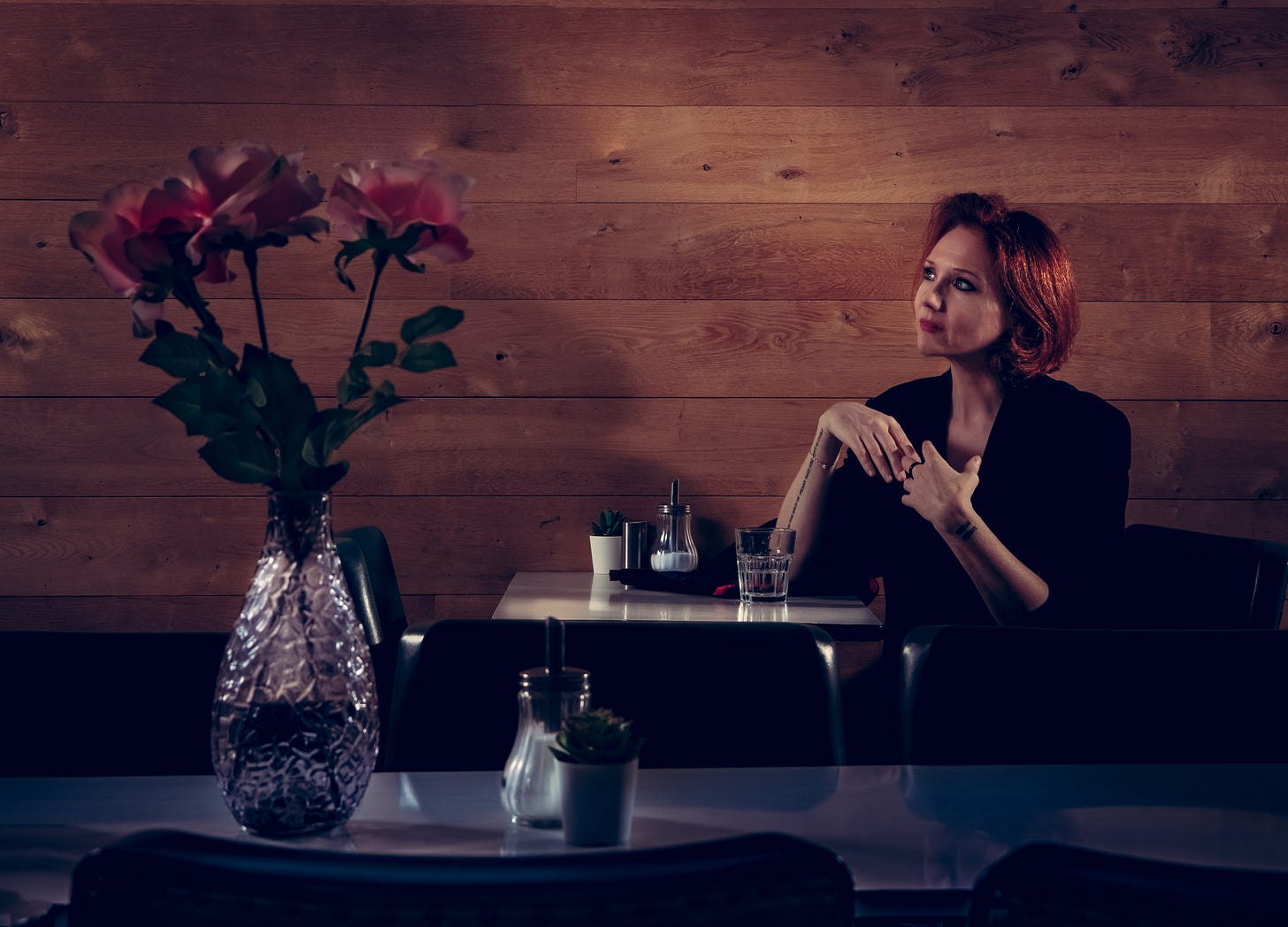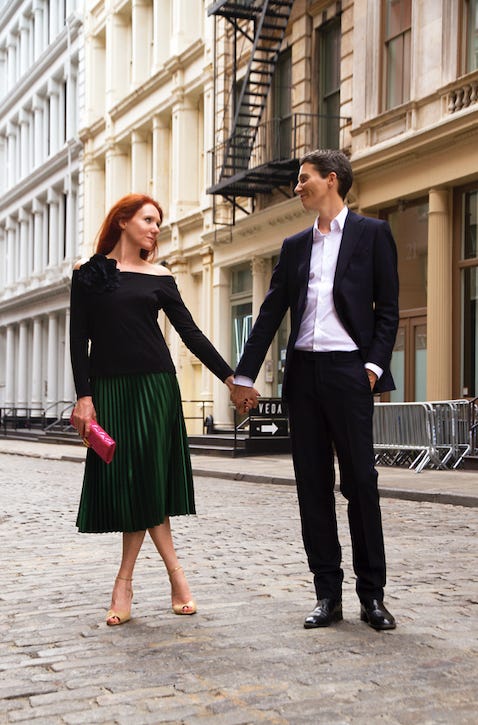Fleur Pierets' books commemorate her wife, and their hopes to wed around the world
Fleur and her wife, Julian, set out to marry in every country that allows same-sex marriage—but then Julian got sick.
When Fleur Pierets met her wife, Julian Boom, the strength of their love created art and activism. The couple started an online magazine, Et Alors?, that explored gender and gay identity in art history, featuring striking imagery of the couple and other LGBTQ+ artists.
Next, they wanted to conquer the world. They decided to get married in every country they legally could. So in 2017, they got married in New York City, then set off to wed in the 21 other countries (at the time) that would allow two women to marry. They only made it to four. Julian was diagnosed with brain cancer and passed away six weeks later, on January 28, 2018.
Since then, Fleur has continued to tell their love story, both in a memoir, Julian, and in a new children’s book, Love Around the World, a gorgeous, illustrated journey of redheaded Fleur and short-haired Julian, who get married in 12 countries, celebrating each one’s unique traditions of love and union.
Pierets shares her story of love, loss, identity, and carrying on Julian’s legacy.
Fleur Pierets and Julian Boom
My favorite love story is ours. It started off in Amsterdam on December 9, 2010 and would travel around the world as an art project: a performance piece in which my wife, Julian, and I would get married in every country that had legalized same-sex marriage. When we started out in 2017, there were 22 countries where two women could get married, so we called the performance 22.
In the course of our performance we were able to add Malta, Germany and Australia to the list. We were building a time capsule that instantly referred to the possibility of change. The ceremonies were filmed. A video and photo installation would travel to all the countries we had visited. We were going to make a book and an on-the-road documentary. A five-year plan had been worked out. We’d never looked that far ahead before. We were living the life of our dreams.
Julian died on January 22, 2018. We had said I do in four countries. When she died, the sun stopped shining.
***
I met Julian at an event about feminism and gender in Amsterdam. She came to sit next to me when the speech started. After a couple of minutes, she asked me if I, too, thought it was boring.
“Yes,” I said. I don’t know if that was really the case, but at that moment there were too many voices and I only wanted to hear hers. Because I was wondering if she was real, if I had not perhaps made her up, as she was the most beautiful person I had ever seen: she was large, with a shaved crewcut and an athletic body that moved lithely. She was dazzling. For a second, my brain shortcircuited because I was wondering whether she was a boy or a girl, but the look in her eyes was decisive. All I wanted to hear was what someone like that would have to say.
We never stopped talking; seven years, nonstop. There were moments where we staggered, stumbled and tripped over our words because we had so much to say. I had never met anyone before who could talk as much as she did. And I listened. Interrupted her. Sometimes we woke each other up to say something. “Is this too much?” we wondered the next morning. But it wasn’t. It had been urgent. Necessary. And we agreed that we were always allowed to wake each other up.
That first night, she told me about her past. About that little village in the Netherlands where she had grown up. Where she fell in love for the first time, in the sandpit, with a girl. She dreamed about a house and children but quickly realized she didn’t fit that mould, so she kept quiet. Later on she wrote long love letters to a girl from school but didn’t sign them. “Nowadays I would be called a stalker,” she told me. On the last day before she moved to another school, she told her classmates she was a lesbian, and she confessed the letters to the object of her affection. To her amazement the girl had been mutually interested. So many years, so many letters, so much left unsaid. So much lost time. How does all that silence affect the rest of your life?
The fact that she was a girl only crossed my mind later. I’d been married to a wonderful man for 10 years, but then I fell in love with a girl and suddenly I was labeled “a lesbian.” I can tell you that coming out of the closet at 37 makes you question the whole concept of Identity. So what is identity? I wondered. For me it’s everything that comes after “I am.”
The strong connection between Julian and I took on many forms. We started an online magazine called Et Alors?—French for “So What?”—and worked toward cultural awareness when it came to gender equality and gay imagery in mainstream art history. Our research-based work as female artist duo JF. Pierets functioned as a mirror in which viewers could confront themselves with their own ideologies or beliefs.
When we found out that most people didn’t know that in most countries around the world you can’t get married when you are gay, we wanted to do something about it. But, just like our magazine, it had to be in style and in a positive way, because in our opinion, that was the first step toward lasting change and building bridges. And we figured that marriage and love, something that everyone can relate to, was a perfect starting point to raise awareness. So Julian and I decided to get married in all the countries where same-sex marriage was allowed.
We wanted to celebrate the countries that legalized gay marriage, meanwhile silently pointing out all the others that didn’t. It was 2017 and we set out to get married in 22 countries. We didn’t have the money to take this journey, but we learned that if we sold everything we had, we would make it to five weddings. And we hoped that after that, there would be some airline or bus company that would want to sponsor our travels and that people would let us sleep on their couches. So we took a leap of faith, sold everything and ended up with one suitcase each. We knew that if this project failed, we would have nothing left.
But we were brave and enthusiastic, and very much in love. Nothing else really mattered.
On September 20, 2017, we officially started our art project by getting married for the first time at the Marriage Bureau in New York City. Every news and media outlet wanted to talk to us. We told a story of hope and inclusion, and the press labeled us as role models. Julian and I got married in New York, Amsterdam, Antwerp, and Paris.
After our wedding in Paris, my wife felt dizzy and was diagnosed with multiple brain tumors. She died six weeks later.
When Julian died, I not only lost the love of my life but also my job, because we were working together. I had no home or belongings to go to, because we sold everything.
It’s been two years now since Julian died, and the only thing that keeps me in this life is my deep empathy and compassion for human suffering. And the idea that I can do something about it; that I have to keep working.
And working is what I do. I wrote a book called Julian about the work we did and our life together, and a children’s book called Love Around the World about two women, Fleur and Julian, who are going to get married in every country where they are allowed to do so. In the book, Julian doesn’t die, and we finish our performance of love.
But every morning I have to make the same effort to open my eyes and put my feet next to the bed. Slowly, and one at the time. And I’m wondering: what if all my happiness, all my enthusiasm, all my lust for life, only existed in combination with Julian? What if it was her, and not gravity, that keeps me in place?

Pierets and Boom
More about the author:
Fleur Pierets is a Belgian artist and award-winning LGBTQ+ activist whose work questions the construction and mainstream understanding of queer identity. She is the founding editor of Et Alors? magazine, an online publication devoted to LGBTQ+ politics, fashion, identity, and other issues. In 2017, she and her wife, Julian Boom, came up with the idea for a performance art project in which they would get married in every country that had legalized same-sex marriage (22 when they started the project, now 28). After four countries, Julian was diagnosed with brain cancer and died approximately six weeks later, on January 22, 2018. Fleur wrote a book called Julian about the work she and her wife did as a female artist couple and the devastation that comes with losing the love of your life. The book was published in September 2019 by Dutch publisher Das Mag. US publisher 6ft. Press launched the first part of her two-volume children’s book series Love Around the World in which Fleur and Julian fulfill the dream of their beautiful project. They travel to Australia, Argentina, Belgium, Canada, Finland, France, Iceland, Ireland, Mexico, the Netherlands, Portugal, and the United States, learning the fascinating traditions and customs and peculiarities surrounding marriage in each country.

Pierets
If you liked this newsletter, please subscribe and share!
Follow me on:
You are not alone!




